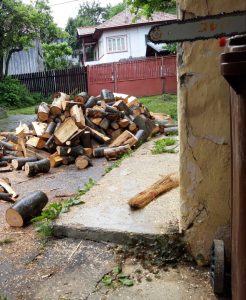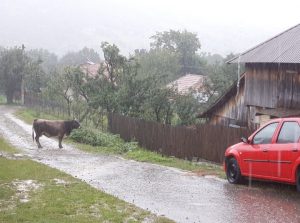Portret de voluntar – Danelle (Malta)
[En]
Hi, My name is Danelle Sciberras. I am 19 years old. I am from a small island in the Mediterranean sea called Malta. I am from a town called Kalkara but I live in Żabbar. I like to travel, exploring new cultures and languages and also their food. I love nature and all its beauty she has to offer. I like to watch movies and reading books as well. I love all kinds of animals especially cats and dogs. I grew up with old Maltese traditions which nowadays they are not so common anymore. I studied a course in college called Health and Social care for 2 years and I passed and I could’ve worked as a social support worker. I wanted to continue studying so I went on to a Bachelor degree course but I didn’t feel comfortable studying management. I am more of a hands on person and this course was mostly about writing and implementing policies. I was unhappy so I left and went to work. I volunteered a lot when I was younger and recently volunteered with amazing kids. For a couple of years I have been interested in doing an EVS and finally I found one that I like and interests me. I am looking forward to everything in these 10 months. 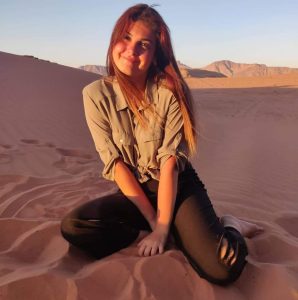
[Ro]
Bună, mă numesc Danelle Sciberras.
Eu am 19 ani. Sunt dintr-o insulă mică din Marea Mediterană numită Malta. Sunt dintr-un oraș numit Kalkara, dar locuiesc în Żabbar. Îmi place să călătoresc, să explorez culturi și limbi noi și, de asemenea, mâncarea lor. Îmi place natura și toată frumusețea pe care o are de oferit. Îmi place să vizionez filme și să citesc. Ador toate animalele, în special pisicile și câinii. Am crescut cu vechi tradiții malteze care în zilele noastre nu mai sunt atât de comune. Am studiat un curs în colegiu numit Sănătate și Îngrijire Socială timp de 2 ani putând să lucrez ca și asistent social.
Am vrut să continui studiile, așa că am continuat un curs de licență, dar nu m-am simțit confortabil studiind managementul. Sunt o persoană consecventă, iar acest curs a fost în mare parte despre scrierea și implementarea politicilor. Am fost nefericită așa că am plecat și am început să lucrez. Am făcut voluntariat foarte mult când eram mai tânără și recent am desfășurat activități de voluntariat cu o serie de copii uimitori. De câțiva ani mă interesează un proiect în cadrul EVS și în cele din urmă am găsit unul care îmi place și care mă interesează. Astept cu nerăbdare aceste 10 luni.
Portret de voluntar – Jānis (Latvia)
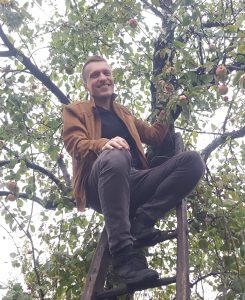
[En]
Hi everybody,
My name is Jānis Jēkabsons and I am 29 years old. I come from Rūjiena, a small rural town in the northern part of Latvia. I grew up in a farmhouse that brought me in close contact with nature and animals, something that will be a lifelong love for me. This is one of the reasons why I am delighted to stay in the lovely village of Schiulesti. Going abroad has always been one of my life goals. I can’t wait to learn the Romanian language.
Education to me is a never-ending process. My formal education includes history and diplomacy. Things that I am interested in are sports, outdoor activities, studying different topics of interest, spiritual practices, traveling, personal development and helping others. My dream is to become a life (transformational) coach and facilitate change.
I am here to provide as much value as I can to the local communities of Romania. I also expect to learn a lot from locals and other volunteers.
Life is like a ladder – never stop climbing to reach new heights, even if you keep falling again and again and again. Persistence and consistent action equal success. We are here to learn, grow, enjoy and support the lives of others!
Much love and see you all soon!
[Ro]
Bună tuturor,
Numele meu este Jānis Jēkabsons și am 29 de ani. Vin din Rūjiena, un orășel rural din partea de nord a Letoniei. Am crescut într-o fermă ce m-a adus aproape de natură și animale, care vor rămâne pentru mine o dragoste constantă pentru tot restul vieții. Acesta este unul dintre motivele pentru care sunt încântat să stau în minunatul sat Schiulești. Plecarea în străinătate a fost întotdeauna unul dintre obiectivele mele în viață. Abia aștept să învăț limba română.
Educația pentru mine este un proces care nu se încheie niciodată. Educația mea formală include istorie și diplomație. Lucrurile care mă interesează sunt sportul, activitățile în aer liber, studierea diferitelor subiecte de interes, practicile spirituale, călătoriile, dezvoltarea personală și ajutorarea celorlalți. Visul meu este de a deveni un life coach(transformațional) și de a facilita schimbarea.
Sunt aici pentru a valorifica pe cât mai mult posibil comunitățile locale din România. De asemenea, mă aștept să învăț multe de la localnici și alți voluntari.
Viața este ca o scară – nu înceta niciodată să urci pentru a atinge înălțimi noi, chiar dacă vei continua să cazi din nou și din nou și din nou. Perseverența și acțiunea consecventă sunt egale cu succesul. Suntem aici pentru a învăța, crește, bucura și susține viața altora!
Multă dragoste și ne vedem în curând!
Portret de voluntar – Ana (Andalucia)

[En]
HOLA! My name is Ana and I come from Andalucia, a beautiful land in España. I like to say the name of my region because for me it is one of the better places in the world to enjoy the life (even knowing how big is the world haha).
I came to the Izvoarele Commune to enjoy the experience with Curba de Cultura during 10 months and to know better how is the charming life in the Carpathian Montains.
I studied Social Work and Social Education, and also a Master Degree in Psychology for Communitarian Intervention. It’s a field to work which I really enjoy and I really think I have skill to develop it. However, I’ve been a bit disconnected of this job during a while because I was discovering the wonderful Wales, in the UK, where I also improved the English language. So now, it’s a really good opportunity for me to reconnect not only with my professional side but also with the non formal education.
I like writing, handcrafts and sewing. And I also love history and politics and being deep on the wise of the local culture wherever I place myself. One of my favorite things is to enjoy the little things of the life in all the senses.
If you have something that I can learn from you and I have something that I can teach you, let’s exchange our time!!
NOS VEMOS PRONTO! 😀
[Ro]
Salut! Sunt Ana și provin din Andalucia, o regiune minunată din Spania. Îmi place să spun de unde vin, deoarece pentru mine este unul dintre cele mai bune locuri din lume în care să mă bucur de viață (și chiar știu cât e de mare lumea).
Am venit în Izvoarele pentru a mă bucura de experiență alături de Curba de Cultură în următoarele 10 luni și de asemena pentru a vedea mai bine cum decurge viața in Munții Carpați.
Am studiat Asistență Socială și Sociologie si am un grad de master în Psihologie pentru Intervenție Comunitară. Este un domeniu de lucru care îmi place foarte mult și cred ca am abilitățile necesare pentru a progresa. Cu toate acestea, am luat o pauză de la acest job și am vizitat și descoperit Wales, din Marea Britanie, unde mi-am și perfecționat limba engleză. Acum am oportunitatea perfectă pentru a reveni la munca pentru care sunt calificată dar și la educația nonformală.
Îmi place să scriu, meșteșugurile, să cos. De asemenea îmi plac istoria și politica precum și să descopăr profunzimea și înțelepciunea în culturile locale, oriunde m-aș afla. Unul din lucrurile mele preferate este să mă bucur de lucrurile mici în viață, în toate sensurile.
Dacă vrei să mă înveți ceva și crezi că și eu te pot învața ceva pe tine, hai sa ne petrecem ceva timp împreună.
NE VEDEM CURĂND! 😀
Importance of environmental protection.
Why it is important to keep the environment and why you can read so much about this in daily news. Does not really people around the world realise the seriousness of the problem or do they just think that what they individually can do and so they try not to pay as much attention to it as they could.
Over the next few years, this topic has become increasingly popular and the consequences of its impact have been brought to the fore in more ways than before. A great many climate activists have come out and have led to many climate strikes. Climate strikes have already achieved something crucial – young people – who really can imagine a different social order have become a platform to fight for their lives. They are not taken very seriously yet, but it has been noticed, that they have the perseverance to continue as long as something finally gets better or they are taken seriously by the others people.
But what each person can do individually to keep the environment a little better off for future generations. Firstly, the small steps you can make in your daily life, namely significantly reducing the use of plastic, by using alternative options, the easiest way to avoid plastic bags, is to own one, or better yet, to make yourself a fabric shopping bag that you can always carry with you. You don’t always have to put all the vegetables and fruits in the plastic, all the while the delicate plastic bags offered in supermarkets have no use for later, you don’t always know if they will last when you get home, so why use them, only burden the environment.
There are annual cleaning days, both worldwide and nationally, but the problem of nature pollution, is still here. A lot of people think, what it can change, if they, individually protect environment and recycle trash. But the change begins with everyone’s initiative. You don’t have to think about how much it will benefit the environment if you recycle and care about the environment but the rest of the world looks like they don’t care.
Since the re-educate people mostly do not succeed, you must correctly change the behavior of an inevitable comfortably.
What if we do not want to leave the goals of sustainable development and active citizenship dependent on people’s random choices?
Moving towards re-educating a person’s environment and relationships rather than re-educating them. For example, active participation needs to be integrated as part of the “real life” organisation. We should probably move towards an environment where some things are “inevitable” for young people but only for young people, for everybody. In the field of environmental sustainability, it is clear that choices that have been made inevitably have the potential to attract people who do not think in terms of environmental sustainability themselves. Waste is also sorted by those who have multiple bins in place of one bin – convenient and inevitable.
Despite the fact that people already have a high level of environmental knowledge and they keep going on the way to be more awareness to moving towards a more sustainable environment. Only the collective awareness of all countries and strong public pressure on our policymakers and businesses will help to make the planet cleaner.
Recycling Differences
Being working in an environmental project the past 9 months and now approaching to end of it got me comparing the waste management and recycling system between Portugal and Romania.
For what the colors go it is the same blue for paper and carton, yellow Plastic/Metal, green for glass and brown for organic waste/food leftovers. In Portugal in every recycling container spot there usually a small red one for the electronic such as batteries and here I didn’t saw a lot if any of those.
By the Paris agreement majority of EU countries set a 50% mark. This basically means that half of their trash should be recycled and both Portugal and Romania are not really following this.
Romania statistics say that only 14% of all the trash made is recycled while Portugal has 39% which is better but still not the goal that they’ve set for 2020 and asked to the EU for two extra years to achieve this goal which was denied.
While my EVS we had one truck passing every Friday for the non-recyclable trash and for the recyclable trash was passing every 2 weeks. Back in Portugal as far as I remember the truck for the non-recyclable passes twice a week while the recyclable passes once per week. In this field I think it isn’t that bad since I come from an average city with way more population than the village that I was living during my EVS.
I had the opportunity to visit both a landfill in Romania and in Portugal and I can see that there’s a big difference. In Romania I visited a landfill from Valeni de Munte and It was a big difference. In here they did almost all the things by hand without help of machinery which is probably one of the causes of the different percentage in recycling rate. While In Portugal there’s a big use of heavy machinery and probably a bigger budget going into this field and having machines helping is good since they can accelerate all the process and having more recyclable trash coming and therefore recycle more.
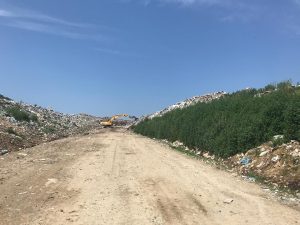
Why should everyone have their own garden? –
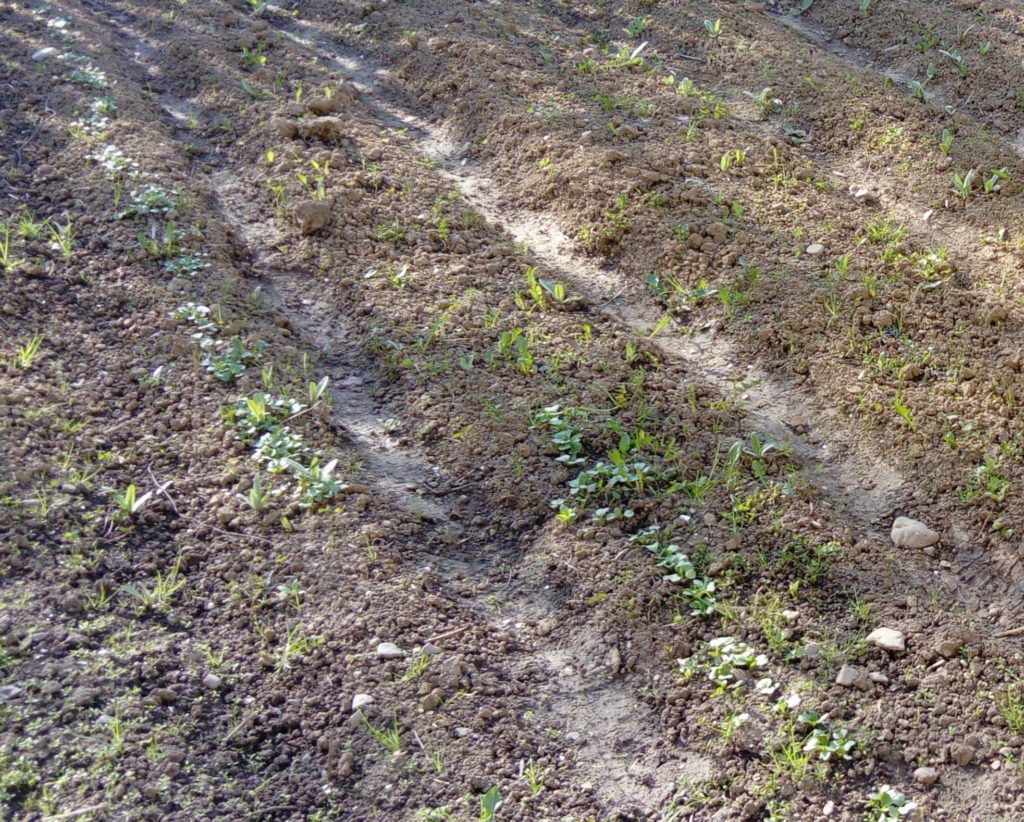
There have been many talks about the usefulness of your garden so far. Why are there so many doubts, especially among urban people, though they do not have the space to grow their own vegetables but for them there are so many different solutions for that.
We will still talk about the usefulness of your garden. Of course, this first requires a lot of work, but it pays off when you see the first fruits that you have grown with your own care and love. Initially you need to think about what you want to plant and where in the planning of the garden, and then it is easier. You take the tools you need and work can begin.
Everyone knows how beautiful the products on the store shelves are compared to their garden products, but do they all know why these are so beautiful. They are full of chemicals and often do not have the right taste. You can compare your garden as a paradise garden, where you have to offer and take everything you can give in the nature and in the mouth and pot. Created without using any plant protection products. It’s not all in colossal quantities, but just so that you can get your vitamin and other essentials right here, from your own garden and from the surroundings. Also medicinal plants. What is cheaper and more profitable for you, whether to buy foreign juices, supplements, chemical-treated fruit and vegetables for expensive money, or to use clean and fresh produce from your garden?
In your garden you will find almost everything, that can be for immediate use or as a herbal medicine. I can give you a few examples if your home garden growing these:
Sorrel- a fresh and crunchy spring source of vitamin C, which quickly relieves stress and provides a beautiful complexion.
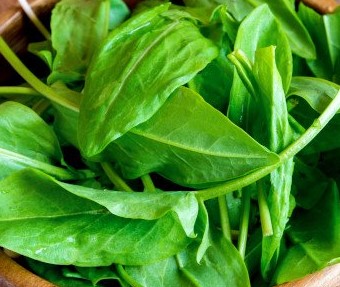
Dandelion- a powerful body cleaner. From root to flower, dandelion are highly nutritious plants, loaded with vitamins, minerals and fiber.
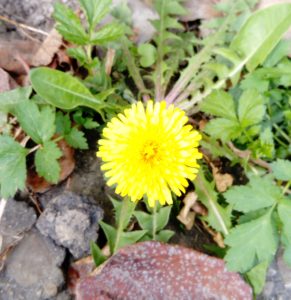
Common nettle- cleanses the body by removing excess fluid from the body and reducing swelling, this contributing to weight loss. Nettle contains rich iron, in addition to proteins and silicic acid. As an evaluated herbal remedy, it helps with many diseases, relieving inflammation and lowering fever.
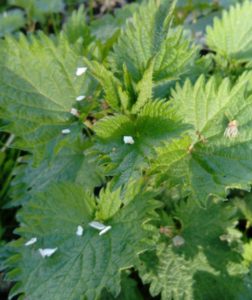
Plantago- it is found on the side walk, as well as on the roadside. This plant is also useful in several fields. Namely, the insect bites, to treat cough and in case of digestive problems.
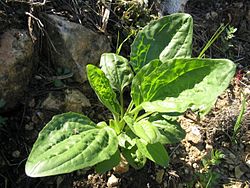
But first and foremost, vegetables, fruits and various berries are grown for their own use in gardening. This is primarily because of the need for free chemical products. It is nice to cut tomatoes and cucumber slices, which has grown in your own garden, in the morning, as well as bake delicious pastries from different berries.
Making your own garden and caring for it later is like a free gym, you don’t have to pay for it, editing in the garden equals the energy spent in the gym, but the result is bigger and more noticeable than just going to the gym. You will get two in one, keep yourself in shape, and in return you will get your own garden products that you have spent time and energy on.
Enjoying the way plants grow. I know you see a lot of effort, patience and time. Many say they do not have the appropriate requirements, but they must be noted.
There is something self-evident, it is great, it is possible, there is to do it, it is necessary to have it, it is necessary what balcony you have.
In the early stages of gardening, we want to experiment, try and forget that everything we have created cannot escape. The more it is, the more difficult it is to remember that your strength will not be underestimated, at first to plant a little, and then, if necessary, to increase the amount you want to grow, because after cultivation, you will have to deal with the later, how to maintain what to keep in mind. So you have to get a little patience and time to take care of everything, because otherwise it doesn’t make sense if all the stuff is wasted or the work is overwhelmed and it will make you sad. Of course, it all depends on the year, whether there are favorable conditions for it or not.
Owning a garden does not mean that you only have to grow vegetables, but you can only grow flowers, grow what you want. But if you have enough space, you can grow both of them, build a garden of gardens and have a vegetable garden. Then there are both products and beauty on the eye.
It is up to the owner of each garden to decide what he wants to grow, for what purpose and to what extent.
Strength and agility in achieving this goal and the patience of awaiting the results, which is a great joy when the first germs grow.
—
Au fost multe discuții despre cât de nefolositoare este grădina ta în ultimul timp.
De ce sunt atât de multe dubii, în special printre persoanele din mediul urban, ei nu au spațiu să îşi cultive propriile legume, dar au multe soluții pentru asta.
Tot o sa vorbim despre cat de nefolositoare este gradina ta. Desigur, e nevoie de multă muncă, dar se merită când vezi primele fructe pe care le ai crescut singur cu propria dragoste si grijă. În primul rând trebuie să te gândești la ce vrei să plantezi şi unde în grădină, apoi e mai ușor. Îţi iei uneltele de care ai nevoie şi treaba poate să înceapă.
Toată lumea ştie cât de frumoase sunt produsele din lădiţele din magazine în comparație cu produsele din grădină, dar oare ştiu ei de ce sunt asa de frumoase? Sunt pline de chimicale şi de multe ori nu au gustul corespunzător. Îţi poți compara grădina cu grădina din paradis, unde trebuie să oferi si să iei tot ce poți sa dai în natura , în gură si în pământ. Să fie create fără sa folosești orice produs pentru protecție. Nu este totul în cantități colosale , dar doar să îți poţi lua toate vitaminele si lucrurile esențialele chiar de acolo, din propria gradina sau din imprejurimi . De asemenea plante medicinale. Ceea ce e mai ieftin si mai profitabil pentru tine, decât să cumperi sucuri străine, suplimente , fructe chimic tratate, si legume pentru multi bani ,sau sa folosești produse curate si proaspete din grădina ta ?
În grădina ta vei găsi aproape orice, care poate fi pentru uz rapid sau medicina cu plante. Îti pot da câteva exemple:

MĂCRIŞ- o sursa proaspăta şi crocanta sursa de vitamina C, ce reduce stresul rapid si asigura

PĂPĂDIA- un puternic purificator al corpului. De la rădăcină la floare, păpădiile sunt flori pline de nutrienţi, vitamine, fibre si minerale.

URZICA- curăță corpul îndepărtând excesul de lichide din corp si reduce umflarea, contribuie la pierderea în greutate. Urzica conține fier, în plus proteine si acid silicic, evaluat remediu medicinal, ajuta la multe boli, ameliorarea inflamării si scăderea febrei.
 PLANTAGO- se găsește pe ,de asemenea pe şosea. Această plantă este folositoare în numeroase campii. Conform numelui, insecta musca
PLANTAGO- se găsește pe ,de asemenea pe şosea. Această plantă este folositoare în numeroase campii. Conform numelui, insecta musca
Dar in primul rand, si cel mai mult, legumele, ructele si numeroase sunt cultivate pentru propria lor utiliare in gradinarit. Asta se intampla mai ales din cauza necesitatii de produse fara chimicale. E dargut sa tai rosii si castraveti in felii, care au crescut in propria ta gradina, de asemenea si sa coci delicioase din diferite
Sa ti faci propria gradina si sa ai grija de ea, mai tarziu e asemenea unei Sali de sport gratuite, nu trebuie sa platesti pentru ea, ingrijind in gradina echivaleaza energia consumata la sala, dar rezultatul este mai mare si mult mai observabil decat mersul la sala. Vei obtine 2 in 1, te pastrezi in forma si in schimb vei obtine propriile taleproduse de gradina pentru care ai consumat timp si energie.
Te bucuri de felul in care plantele cresc. Stiu ca vezi mult efort, rabdare si timp. Multi spun caai nu au cerintele adecvate, dar si ele trebuie observate.
În primele parti ale grădinaritului vrem să experimentăm, să încercăm si să uităm ca tot ce am creat nu poate scapa. Cu cat e mai mult, cu atât e mai dificil sa ti aduci aminte ca puterea ta nu va fi subestimata, la început plantezi putin, apoi, daca e necesar, ca sa cresti cantitatea pe care vrei sa o cresti, pentru ca după cultivare, nu va trebui sa , cum sa mentii ce vrei să tii minte. Deci trebuie să ai putina răbdare si timp sa ai grija de tot, altfel nu are sens dacă materialele sunt risipite, sau munca e copleșitoare si te va face trist. Desigur, depinde de an, daca sunt condiții favorabile sau nu.
Sa ai o grădină nu înseamnă ca doar trebuie să cresti legume, poti sa cresti doar flori, ce vrei tu. Dar daca ai destul spatiu, le poti creste pe amândouă, sa faci gradina grădinilor si să ai o grădină de legume. Atunci sunt ambele produse si
Deținătorul fiecărei grădini decide ce vrea sa crească, pentru ce scop si ce sa extindă.
Puterea si agilitatea în a îndeplini acest scop si răbdarea pentru a aștepta rezultatele, e multa fericire când primii germeni cresc
The 5 important tips and tricks to organize treasure hunt
What is it, the treasure hunt, loved by children but not only for kids, you can also make it for adults. How can it be carried out?
Treasure Hunt is a classic landscaping game where players search for a lost Treasure Chest according to legend. Exploring the countryside and visiting the “distant lands” ends with an unpredictable finale-finding the treasure chest.
Organising a treasure hunt may seem like a lot of work, because it needs to be thought through to the details but the end result is worth it. In this article you will find the main points to keep in mind when starting to plan a treasure hunt. At first, it seems very simple and straightforward, but if you are one of those, who have to organise it, then it turns out that you have a lot things to work out, to get a workable solution.
Because children enjoy being active and working together, it is a positive thing to enjoy the reward later. Even though this treasure chest filled with candy is a fun find for most kids, the real treasure is in the hunt!
How to start it. First, you need to find a theme, a story that builds up all the treasure hunting activity. Next part is the place, it can be done indoors or outdoors, but usually it’s easier to organise it outdoors. Then you will need to know the tasks that the participants will need to complete in order to move on to the next point. Last but not least is a hint that will help your participants to go to the next point.
Now a few tricks to simplify the organisation of this activity:
-
Plan your route. Ask for locals to help you, when you do not know the area well, they can also help you for the translation part, if you work with people, who do not speak your language.
-
Determine the Number of Clues You Will Have – Set a number of clues from the very beginning. This will make the rest of your planning much simpler. Don’t forget to consider the age and size of the group.
-
Give yourself lots of time to plan – It took time to map out a route, identify good places for clues and write out the hints for each place. Once the mental work was done, the physical prep felt much less onerous.
-
Prepare for contingencies – like sealed all the clues in plastic bags so they wouldn’t get soaked in the event of rain.
-
Go with them – it would have been great to have one or two people with the group—one to race ahead with the speedier kids and one to bring up the rear with the dawdlers.
After all that, do not forgot to enjoy it. Even it is a competition the main part need to be fun. It is a pleasure to see in the eyes of the children that they enjoy for the whole event you have organised for them.
Treasure hunts are a fun and easy way to enjoy time with your kids, strengthen your staff through team building, or enjoy time with friends and family. Competition encourages teams to work together or individuals to think creatively and build resourcefulness.

My reflection about the competition of essays
Since the end of January I have been in Romania within the framework of an EVS in the organisation Curba de Cultura. And thus also in a project called BYSC-E, in which there are two more volunteers, with whom I also share a house.
Now about 8 months have passed and we have organized many different projects and events.
The basic idea of the project is to teach children and young people about environmental issues. But apart from imparting knowledge, it is also (and above all) about rising awareness towards topics such as recycling, environmental pollution and one’s own ecological behaviour. The mediation takes place in schools and outside the schools.
In the course of time we have planned and carried out many “school lessons”. But our didactic plan differs from that of the school. We focus on non-formal education and structure our lessons accordingly.
We go to schools and build bins with the young people in which they can separate the trash and we talk to the pupils about recycling and the responsibility of each individual. This usually takes place in the lower grades.
We try to convey knowledge in an interesting and appropriate way for the target group, through games or interactive design.
We also offer many activities outside the school. On World Environment Day, for example, we have organized an exhibition and a debate in our youth centre. We have invited young people to talk to them about their future in an increasingly globalised world and what opportunities each individual has to contribute to a more ecological world.
During the school holidays we organized a camp in which we dealt with four days of environmental topics. We did workshops with the children where they could try out how to make useful things out of trash. We also organized a hike with the children to pick up the trash in the forest.
Besides these activities, there were also activities for which each of us was individually responsible.
As described above, we go to schools to discuss environmental issues with the students. Besides lower grades we also went to high schools.
In this context I was responsible for a certain activity.
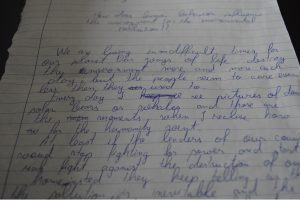
The idea was to organize a competition based on creative writing in the 12th grade. Of course thematically appropriate. So I thought about which topic could be interesting for the target group and how I could implement it. The topic was “How does human behavior influences the environment ( or the environmental pollution) ?”
I decided to leave it up to the students to choose which text form to use, so it could be an essay, a poem, a song or something like that. The idea was to give the students the plan so that each student could write something. One week after the writing I should go back to the same class to “award” the best text and go deeper in the topic.
So I went to school with this plan. I presented my idea to the students in the presence of the teacher and focused on the free choice of text. I think this was something new for the students. The focus, as mentioned above, is on non-formal education. I wanted the students to know that they could express themselves the way they wanted.
But (unfortunately) it went a bit different. While I was still explaining my plan, I was interrupted by the teacher who reminded the students how to structure an essay and remind them of the corresponding school lessons. She also told the students that they should substantiate their texts with many facts. I explained again that each student can express him- or herself as (s)he wishes. And that it will not evaluate with marks. So the students started writing and every student wrote something on his or her paper. I took the texts with me to read them. Contrary to my expectations, many students disregarded the teacher’s instructions and wrote very personal and poetic (regardless of a perfect structure) texts. Much to my delight.
The next week I went back to class to talk to the students about their texts. Unfortunately there was no real discussion and I decided to change the content of the lesson. I also decided not to award the best text.
Two things I learned during this activity or were a gain in knowledge for me:
1. I was very surprised by the content of the students’ texts. Most of the students drew a gloomy picture of the future in relation to the environment and seemed more or less helpless and powerless in their responsibility.
2. I and we propagate again and again a knowledge transfer based on non-formal education. Not only since our project, but for many years. I have found (and not only in this activity) that it is still new territory for teachers and that they find it difficult to implement or accept this form of education.
It’s no big surprise that some teachers have a hard time with these aspects. I think that the school system (not only in Romania!) is largely based on a clearly formal curriculum and this determines the everyday life and thinking of the teachers. So they are certainly very well educated in their field and know how to transport this knowledge in the way mentioned above.
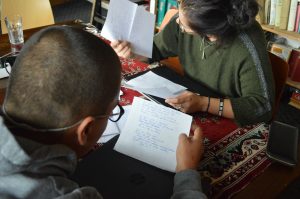
Nevertheless, I and we try to implement other aspects of education, not only the mediation, but also the contents into the everyday school life.
Fortunately, we have cooperations with the schools in the area and can slowly but surely introduce a different kind of mediation. Not to replace the teachers, but to supplement them!
5 things when you are living in a rural area in Romania.
The house :
If you have a light sleep, it’s 5 am and you wake up because the rooster from the farm next door thought it would be a good idea to start the day at that time. Otherwise it’s 9 am and it’s time to get up.
First step, the bathroom. Living in a typically traditional house, this one isn’t really at the cutting edge of technology. If you are in winter, it’ll probably be very cold. It’s therefore strongly recommended to buy a small auxiliary heater. It’s also possible that you have no water but no panic, usually you’ve at best 30 minutes to wait and at worst 4 days. This often happens after a lot of rain, so take your precautions!
Once this step is completed, you should know that toilet paper don’t go into the toilet but into the next bin.
You should also know that in this type of house, there’s no centralized heating. You’ll therefore have to make a fire in each room if you want your house to be heated. For that you will obviously have to cut wood and dry it otherwise it will not take.
Despite all this, life in a traditional house is a very relaxing thing, life is simple and it’s very pleasant to wake up for example with a view of the mountains and a beautiful sunrise.
The transport service :
In Romania, in rural areas, transport isn’t very efficient. Sometimes you only have 2 or 3 buses during the day. It’s also true that trains are rather slow. So if you want to get somewhere as soon as possible, the best way is still to hitchhike. As everywhere it’s always advisable not to do it alone, but it’s always the easiest way to get from point A to point B.
However, if you want to take your time and enjoy your trip, I strongly recommend the train. You’ll have the opportunity to enjoy the wonderful landscapes that Romania has to offer. You’ll also meet many great people who will be happy to help you on your journey.
The language :
Being in another country it’s normal that you do not speak the same language. Romanian is a Latin language and has a lot of similarities with French, for example, so you can always try to make yourself understood. In rural areas, very few people understand and speak English, so it’s strongly recommended to learn a few words that will be useful to you such as: count to 10; say hello; or ask for directions. No matter how many mistakes you make, the person you’re talking to will usually be very happy if you make the effort to speak their language. So don’t hesitate to get started!
The shopping :
Generally in small villages, you can find many small shops. You can find the essentials there. It’s very convenient when you’re missing something. The disadvantage is that very few of them take the card. You will therefore constantly need to have change with you just to be sure.
What is also good in Romania are the “Second Hands Shops”. There are some everywhere and you can really find great and cheap things. In an average city there are usually at least 4-5 of them and if you’re in a small village just look around and you will certainly see at least one. Again, they do not normally take the card or so rarely fill up with change.
The food :
You can’t go to a country without tasting traditional food. There are many very different dishes but the main ingredient will often be meat. For a Romanian person a meal isn’t a real meal without meat. Even if you can eat meatless dishes like Mămăligă or Sarmale, which are made of corn and cabbage respectively.
Don’t hesitate to visit one of these small open markets to taste Mici and find fresh and local produce. During this short outing you will also see people selling alcohol in water bottles. These are Pălinca and Țuică, traditional alcohols made from fermented fruit (usually plumbs).
In Romania, you also have some special bakeries. Indeed, you can’t really get into it but you have to order what you want at a small window. Some are specialized in the sale of sweet products and others in salty products.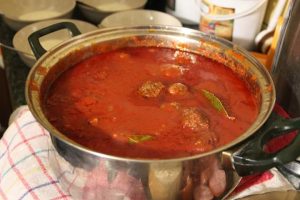
In short, don’t be afraid to make new experiences, you’ll be pleasantly surprised. Romania is a beautiful and welcoming country!
Discovering Romanian culture –
The topic of the following article is « Discovering the romanian culture ». In here, I would like to talk about what I felt as differences from France in Romania, considering the culture as a set of patterns gathering specific beliefs, behaviours, language, method of production … shared by people constituting a specific society this way. Living in Schiulesti, in Izvoarele commune, I experiment far more the rural Romania than the urban one. And talking about way of living, it seems to make a big difference. However, I’d like to specify the fact that I don’t speak romanian, what does not help to create a contact with the neighbourhood. In Schiulesti for example it is rare to find someone who speaks English. It is a rural area specificity I guess, in Bucharest almost everybody speaks English. What I mean is that my first personal observations are maybe not this significant because of not enough dialogues with natives.
First I’d like to talk about something which surprised me: paradoxical feelings some Romanian have toward their country being both proud and ashamed. In the streets, both in where we live and in Bucharest we can see Romanian flags hung on a balcon or in the garden what only happens during the football world cup in France, especially when the french team win! In Schiulesti, many people talk about the beauty of the landscapes surrounding the village, and more generally the inhabitants seem interested in sharing traditions such as preparing sarmale for Christmas. Sometimes this pride seems to be extreme, expressed by a strong feeling of patriotism and especially with a bipolar vision dividing still the world between west and east as if the cold war never finished. Indeed, we’ve already had dialogues turning into conflict just talking about our studies in France, we felt then this resentful we can find in here toward the west. Also, this strong expression of patriotism is often shared with a discriminatory vision of the society rejecting both gypsies, homosexuals, more generally the minorities. If those people want to remain in Romania forever and ever, there are others who express easily shame toward Romania. For example, when we said to a cashier we enjoyed our life in here she laughed at us saying « Are you kidding ? » Many young people sound to want to go abroad, and do not see their future in the country according to little interviews we did on our On Arrival Training (OAT) in Bucharest. For many, that decision to go abroad seems obvious. As if the future was abroad. But when in many rich countries such as France, more and more thinkers talk about the necessity to consume less, the necessity of economic decrease not only for the planet but for the entire society, maybe Romania is in some ways ahead of his time, especially in the rural areas.
In here, the rythm is totally different from the one in the cities. In Schiulesti there are around four bus per days during the week. No bus the week end. There are little shops in which you can only pay by cash. In most of the houses, there are no central heating system, it’s doing fire you warm the rooms. You don’t have fancy devices to cook or to cut the grass. But even if there is no bus, no car, no Nespresso machine to prepare the coffee, no George Clooney neither, you find ways to do what you have to do and that with the help of people. You need to go to the city ? You can easily find a car which is also going to Valenii de Munte, people very often stop for hitchhikers, it’s usual. It maybe sounds nothing but I think it’s far different from a usual mind of consumer : it is a smart, solidar and simple way of thinking : how can we cultivate the garden with the tools we have ? How can we cook with the ingredients left ? How can we make the house more attractive with what there is in the attic ? And adopting this point of view, you realise the wealth you have around you because of the garden, because of the well, because of people with big knowledge about nature… The relationship with the nature seems to me also different from the one I knew. For example, in the village we see many cows/ chicken/ horses walking freely. In the same time animals seems to be considered in a functionnal way, as tools with the horses carrying wood from village to others or dogs chained to protect the house but people often let them walking on the streets especially the week-end. As if their owners trust their animals enough to let them go freely. They look confident about that when in France animals are always locked up. I’d like to be able to have a dialogue in romanian to speak with the neighbourhood in here. There is a community spirit, everybody greets you and many want to talk with you even if you tell them that you can not speak romanian. What is frustrating ! The community is also cohesive because of the religion. Almost everybody makes the sign of the cross in the bus when we meet a church and there are many orthodox churches around !
The community I was talking about seems to me particularly conservative because of different observations we can do. As I said, the religion seems still very important because of the cross signs, religious celebrations such as Eastern, prepared way ahead and even in the schools, the marriage remaining something very important in here… What’s more there is apparently a big gap between female and male roles with places with men only such as the bar we have in Schiulesti, main place of socialization, the same with the places to drink in Izvoarele village. During the weekend we can see women gathered in front of their houses, talking together on benches when men are in the bar. This conservative seems also present in school with quite strict teachers, with strong vertical relationship and education by exclusion of children who are not in the norm : with disabilities, with family issues…
To conclude, I’d like to share my personal feelings about these first months I spent in here, living in Izvoarele commune. There are for sure bias in my perception because I am in here as a volunteer for Curba de Cultura and living with other international volunteers I don’t really share life conditions/habits/rythm natives have but the environment in here is very quiet I guess because of the wonderful landscapes we have around but also because of a slower countryside rythm which makes you slowing down in your own mind also. What’s more, people in here welcome us even if we have obvious different way of thinking/ way of life and even with the language gap, they want to meet us, to greet us. What makes our time in here very pleasant.
/RO/
Subiectul următorului articol este Descoperirea culturii române. Aici, aș vrea să vorbesc despre ce am simțit ca diferențe din Franța, în România, considerând această cultură ca un set de modele care adună convingeri specifice, comportamente, limbă, metode de producere… transmise de oameni, constituind astfel o societate specifică. Locuind în Schiulești, în comuna Izvoarele, am experimentat mult mai mult partea rurală a României, decât cea urbană. Și vorbind despre felul de a trăi, întâlnim o mare diferență. Oricum, trebuie să specific că eu nu vorbesc limba română, iar acest lucru nu ajută la crearea unui contact cu vecinii. În Schiulești, de exemplu, este rar să găsești o persoană care vorbește limba engleză. Cred că este o zonă rurală specifică, în București aproape toată lumea vorbește engleză. La ce mă refer este faptul că primele mele observații nu sunt atât de semnificative, deoarece nu am purtat dialoguri îndeajuns cu nativii.
Pentru început, aș vrea să vorbesc despre ceva ce m-a surprins: paradoxalul sentiment al românilor față de țara lor, fiind atât de mandri și rușinoși în același timp. Pe străzi, în ambele locuri unde locuim, în București, putem vedea steagul României fluturând pe balcon, în grădină, iar acest lucru îl întâlnim în Franța doar în timpul meciului de fotbal pentru cupa mondială, în special când echipa franceză câștigă! În Schiulești mulți oameni vorbesc despre frumusețea peisajelor înconjurătoare, iar în general locuitorii sunt interesați să transmită tradițiile, cum ar fi prepararea sarmalelor pentru Crăciun. Uneori, această sarbătoare pare a fi extremă, exprimată printr-un sentiment puternic de patriotism și în special cu o viziune bipolară, împărțind lumea în vest și est, ca și cum Războiul Rece nu s-ar fi terminat încă. La fel, deja am purtat discuții contradictorii despre studiile noastre din Franța, apoi ne-am simțit ofensați de ce am găsit aici, în zona vestică. Totodată, acest puternic sentiment de patriotism este transmis des din prisma viziunii discriminatorii despre societate excluzând țiganii și homosexualii, în general minoritățile. Dacă acești oameni ar vrea să rămână în România pentru totdeauna, sunt alții care își exprimă ușor rușinea față de țară. De exemplu, când noi îi spunem unei vânzătoare că ne bucurăm de viața de aici, ea râde și spune „ – Voi glumiți?” Mulți tineri sunt tentați să meargă în străinătate, deoarece nu reușesc să-și vadă propriul viitor în țară, în conformitate cu scurtele interviuri pe care le-am realizat în cadrul OAT (Curs de formare la sosire), București. Pentru mulți, aceea decizie de a pleaca în străinătate pare singura opțiune. De parcă viitorul ar fi fost deja în străinătate. Atunci când în majoritatea țărilor dezvoltate, asemenea Franței, din ce în ce mai mulți intelectuali vorbesc despre necesitatea consumului redus, necesitatea descreșterii economice este importantă nu doar pentru planetă, dar și pentru întreaga societate, poate România este în frunte în unele părți de această dată, în special în zonele rurale.
Aici, ritmul este total diferit de cel din oraș. În Schiulești există în jur de patru autobuze pe zi în timpul săptămânii. Nici un autobuz în weekend. Sunt magazine micuțe în care poți plăti doar cash. În majoritatea caselor nu există încălzire centrală, se face focul pentru a încălzi camerele. Nu ai dispozitive fantastice pentru a găti sau pentru a tăia iarba. Dar chiar dacă nu există nici un autobuz, nici o mașinărie Nespresso care să pregătească cafeaua, nici George Clooney, găsești modalități de a face ceea ce trebuie să faci și asta cu ajutorul oamenilor. Ai nevoie să te duci în oraș? Poți să găsești ușor o mașină care merge de asemenea spre Vălenii de Munte, oamenii opresc des pentru autostopiști, este ceva obișnuit.
Poate nu vă sună nimic, dar eu cred că gândirea este cu mult diferită de cea obișnuită a consumatorului: este un mod de gândire inteligent, solidar și simplu: cum putem cultiva grădina cu uneltele pe care le avem? Cum putem găti cu ingredientele rămase? Cum putem face casa mai atractivă cu ceea ce există în pod? Și prin adoptarea acestui punct de vedere, îți dai seama de bogăția pe care o ai în jurul tău datorită grădinii, datorită fântânii, datorită oamenilor cu mari cunoștințe despre natură… Relația cu natura mi se pare, de asemenea, diferită de cea pe care am știut-o. De exemplu, în sat vedem multe vaci/ pui/ cai care merg liber. În același timp, animalele par a fi considerate într-o manieră funcțională, cum ar fi uneltele, caii care transportă lemn din sat în altele sau câinii legați pentru a proteja casa, dar oamenii le lasă de multe ori să meargă pe stradă, în special la sfârșitul săptămânii. Ca și cum proprietarii lor ar avea încredere în animalele lor suficient pentru a le permite să meargă libere. Ei par a fi încrezători, pe când în Franța animalele sunt întotdeauna închise. Aș vrea să pot avea un dialog în limba română pentru a vorbi cu vecinii de aici. Există un spirit comunitar, toată lumea te salută și mulți vor să vorbească cu tine, chiar dacă le spui că nu poți vorbi în limba română. Ceea ce este frustrant! Comunitatea este, de asemenea, coezivă datorită religiei. Aproape toată lumea face semnul crucii în autobuz, când întâlnim o biserică… și există multe biserici ortodoxe în jurul nostru! Comunitatea despre care vorbeam pare a fi extrem de conservatoare din cauza unor observații diferite pe care le putem face. Așa cum am spus, religia pare a fi încă foarte importantă din cauza semnelor, a sărbătorilor religioase, cum ar fi cea de Paște, pregătită înainte și chiar în școli, căsătoria rămâne ceva foarte important aici… În plus, există un mare decalaj între rolul femeilor si al bărbaților, cu locuri numai pentru bărbați, cum ar fi cârciuma pe care o avem în Schiulesti, locul principal al socializării, la fel ca și locurile de băut din satul Izvoarele. În timpul săptămânii observăm că femeile s-au adunat în fața casei lor, vorbind împreună și stând pe bănci, atunci când bărbații se află la bar. Acest lucru conservator pare, de asemenea, prezent în școală, cu profesorii destul de stricți, cu o puternică relație de verticalitate și educație, prin excluderea copiilor care nu se află în normă: cu dizabilități, cu probleme de familie…
În concluzie, aș dori să împărtășesc sentimentele mele personale despre aceste prime luni petrecute aici, pe care le trăiesc în comuna Izvoarele. Există o anumită părtinire în percepția mea, deoarece sunt aici ca voluntar pentru Curba de Cultură și trăiesc împreună cu alți voluntari internaționali. Nu prea îmi împărtășesc condițiile de viață/ obiceiurile/ ritmurile native pe care le am, dar mediul înconjurător aici este foarte liniștit. Cred că datorită peisajelor minunate pe care le avem în jur, dar și datorită ritmului mai redus al vieții de la țară, te fac să-ți liniștești mintea. În plus, oamenii de aici ne întâmpină bine, chiar dacă avem un mod diferit de gândire/ mod de viață diferit și chiar și cu decalajele de limbă, vor să ne întâlnească, să ne salute. Ceea ce face sejurul nostru de aici foarte plăcut.
Caroline este în România pentru o perioadă de șase luni, din martie 2019 până în august 2019, în cadrul proiectului Voluntary Generation [2017-2-FR01-KA105-013326] proiect co-finanțat de Uniunea Europeană prin Programul Erasmus+ și implementat în România de către Curba de Cultură.
